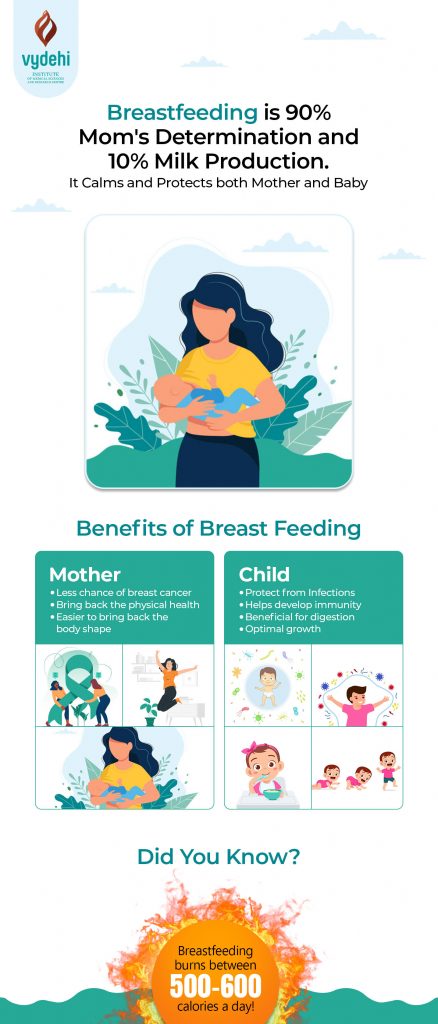Even the walls of the hospital’s labor ward yearn to hear a child’s first cry. It is at that auspicious moment when a child is born, a woman is re-born … as a mother. They say as you hold the newborn in your hands, all pain and struggles of childbirth vanish as if like magic. The purest form of unconditional love can be seen in the eyes of a new mother. The new mother is bombarded with ‘helpful’ suggestions from friends and family and some even ask google just to ensure that the child receives the best of everything. What then is the first and the best food for the infant?
Breast Milk is the best:
Breast milk is the ideal food to meet the nutritional needs of the newborn baby. Mother’s milk contains all the Nutrients, Vitamins, and Antibiotics along with the energy to provide immunity from the long list of illnesses. Breast milk feeding is an effective way to ensure a neonate‘s health. Every breastfeeding mother concerned about the baby’s well-being is advised by the doctor to feed extensively for the first 6 months after birth. This form of nourishment is perfect for the child as it is of the right temperature and easily digestible for the infant’s immature system. Doctors call breast milk “the superfood for the baby” as it is a natural and healthy source of Proteins, Carbohydrates, Minerals, and Fats. For the necessary neurotransmission and neuromodulation, amino acids like taurine and cysteine present in mother’s milk, fuel the baby’s body and promote healthy growth. The hormones like prolactin promote milk synthesis in the mother and oxytocin which is called ‘the milk ejection reflex’ is responsible for the easy ejection of milk. Hence the consumption of foods like nuts, oranges, green vegetables, etc promotes this hormone synthesis.
Along with important hormones, this ‘superfood’ provides vital enzymes like lipase to increase the digestion of the fats present in the milk, and growth factors like epidermal growth factor, which enhances the maturation of the intestinal cells. This reduces the risk of allergy and other related complications in later life. Osmolality is the concentration of the solute particles in any solution and the osmolality of the mother’s milk is extremely low thereby supporting the immature kidneys of the infant to gradually acclimatize to nutritional intakes and waste removal.
Breastfeeding is important as it protects the baby from respiratory infections and digestive issues.
BABY, Consume the Colostrum:
The nutrient-rich first form of breast milk Colostrum is composed of a high amount of immune and growth promoters, bioactive components, elements with anti-inflammatory properties, and antibiotics such as IgA, IgG, and IgM in comparison with mature milk. Colostrum activates the immune system of the newborn and stimulates the function of the gut which helps in the creation of a healthy microbiome in the gut. At the time of birth, bilirubin which is the waste product of the dead red blood cells is produced in huge quantities. This waste product is excreted as meconium which is the first stool of the baby. Colostrum promotes this excretion process known as a laxative effect.

Do it and don’t do it:
New mothers are often overwhelmed by the tornado of emotions they experience with feeding anxiety at the core. Here are a few things that a mother needs to consider.
1. Patience and Practice: The process of breastmilk feeding is very new for both the mom and the child. It will take time to get used to it. Have patience and give the baby time to learn the art of suckling.
2. Nothing other than Breast milk: The first six months of the baby’s internal systems are very delicate and not mature. During this period, feeding other kinds of milk – animal, powdered, vegan – or foods like honey,semi-solid foods, mashed fruits, fruit juices, and even water are considered unsuitable for the baby’s sensitive digestive system.
3. Positions and posture: Whether in a seated, standing, or lying down position, it is important that both the mother and baby are comfortable. The baby’s body and neck must be well supported alongside the mother.
4. Meal through Mom: An infant’s nutrition source is mother’s milk. Hence it is essential to provide nutrient-packed food to the breastfeeding mother. Intake of protein – vitamin-rich food, the diet which contains meat, eggs, vegetables, grains, dairy, etc. helps the mother to recover quickly, and helps in the secretion of quality milk. Caffeine, alcohol, mercury-rich food, and processed foods can affect the mother’s and child’s health.
5. Your breast needs your care: Pregnancy and lactation will bring change in a woman’s body and the breasts in particular. Proper care is required to maintain good hygiene. Don’t roughly wipe the nipples after breastfeeding; instead, gently pat dry with soft tissue or cloth, however, the better way is to air dry. Supportive bras prevent the breasts from sagging and relieve the strain of heavy breasts. For rashes or skin allergies, a doctor’s consultation is a must.
6. It’s okay to breastfeed your baby in public places: Many Indian mothers feel uncomfortable feeding their babies in public. Choose an attire that gives the baby direct access to the breast. Lactation rooms, dressing rooms, women’s lounges, etc. can be chosen for fearless feeding. It is good to carry a shawl to cover the breastfeeding baby to maintain privacy and allow the baby to feed free of distractions.
Store and Care:
A working mother who cannot take her child to the workplace always seeks a healthy alternative. Unfortunately, there is no replacement for the mother’s milk, however, with today’s advanced technology, mechanical devices like breast pumps, allow to express breast milk and store it in advance for infant consumption. The shelf life of freshly expressed or pumped milk at room temperature (25°C) is 4 hours, and it can be increased to 4 days if it is refrigerated at around 4°C. This superfood remains in good condition for up to 6 months if frozen at 18°C. Wash your hands and breast before expressing milk. Use a cleaned manual or electric pump, and always prefer to store milk in a good glass bottle with an airtight lid.
Donate to feed other’s babies:
Malnutrition, low immunity, low body weight, improper body development, etc. can be seen in babies as the result of breast milk deficiency. Lack of breast milk is also a considerable reason for child mortality. Various hospitals and organizations collect human milk and supply it to needy babies. A lactating mother can donate her excess milk, as sharing prosperous milk can save many little lives.
HIV mother and infant feeding:
The greatest apprehension of an HIV-positive mother is breastfeeding her infant to avoid transmission of the Human Immunodeficiency Virus to her kid. According to the studies, a baby can test positive for HIV if a mother living with HIV feeds her milk. In such an instance it is better not to feed the infected mother’s milk to the child. The HIV-infected mother can choose the perpetual dependency on ART (Antiretroviral therapy), the most effective method to prevent HIV transmission.
Giving birth to a baby brings happiness in abundance. The bond between a mother and child is enhanced with breastfeeding and establishes strong emotional communication. Whether a new mom or a mother of many children, each experience of renewed motherhood is challenging, yet even on those hard days seeing the suckling infant reminds you why it’s all worth it. A mother and her baby need no language to express their emotions … the bosom milk blossoms your emotions and unfettered love and affection. Feed the love potion extensively and never hesitate to visit a doctor for health issue-related assistance.
Disclaimer: The information included here is only for knowledge-sharing purposes, and the blog is not intended to be a substitute for diagnosis, medical advice, or treatment by a healthcare professional. Every individual needs advice based on diagnosis and evidence, hence the reader should consult their doctor to determine the disease and any treatment must be taken under appropriate medical guidance.
Read about Neonatal Jaundice Symptoms, Causes, and Risk Factors in Newborns

 Emergency Number
Emergency Number
I get pleasure from, result in I discovered just what I used to be looking for. You’ve ended my four day long hunt! God Bless you man. Have a nice day. Bye|
Very informative good to see details
Good Details …Nyc article
This article gives clear idea designed for the new people of blogging, that really how to do running a blog.|
Hi there, just became alert to your blog through Google, and found that it is really informative. I am going to watch out for brussels. I’ll be grateful if you continue this in future. Many people will be benefited from your writing. Cheers!|
Any lactose free infant milk substitute?
Thank you for your article on Breastfeeding: Extensive Feeding of Unconditional Love
The nutrient-rich first form of breast milk Colostrum is composed of a high amount of immune and growth promoters, bioactive components, elements with anti-inflammatory properties, and antibiotics such as IgA, IgG, and IgM in comparison with mature milk. yes you are right thanks for giving this informative blog
What will be the best infant milk substitute?
Apart from breast milk, which is the best baby nutrition food?
I gave birth to Arna recently. I usually search the internet just to provide the best for her. This blog is very informative. Keep up the good work.